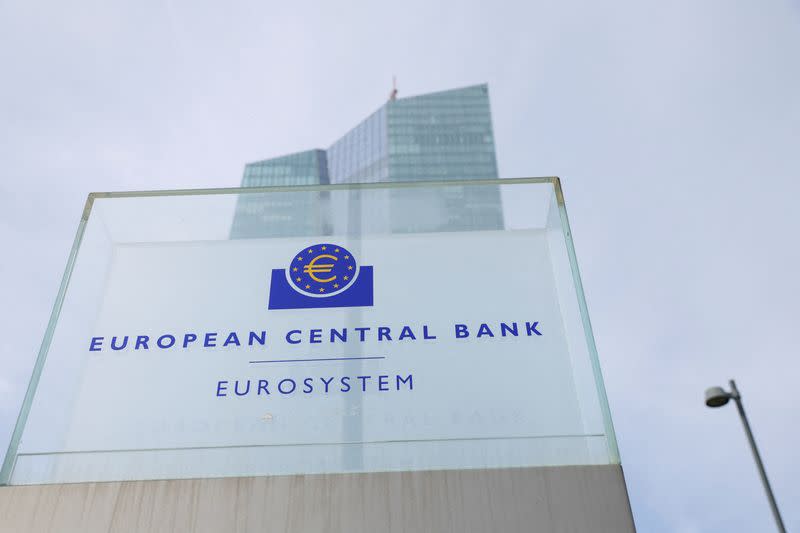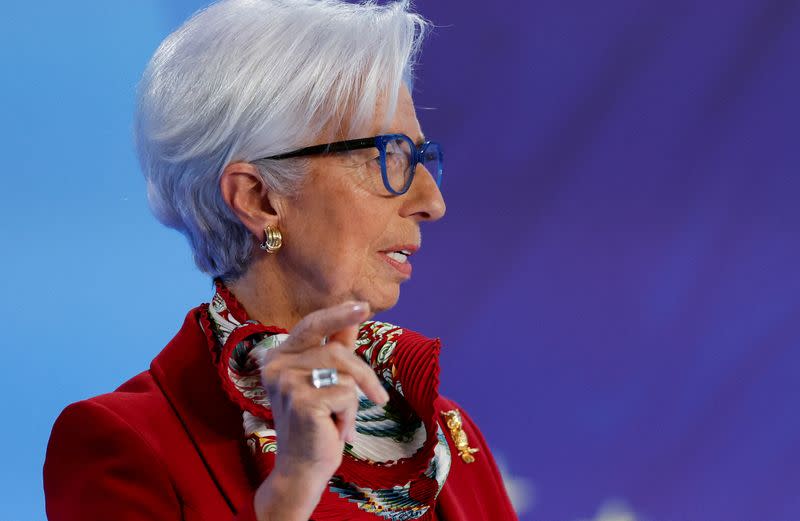Just hold on: Five questions for the ECB
By Yoruk Bahceli
(Reuters) - The European Central Bank meets on Thursday to take stock of how the euro zone economy is faring a month after it cut interest rates for the first time five years.
Inflation has dropped since the ECB last met but has failed to budge in the dominant services sector. Some policymakers felt cornered into June's rate cut and are in no hurry to flag what's next.
"They don't want to give away anything," said Dirk Schumacher, head of European macro research at Natixis.
Here are five key questions for markets:
1/ What will the ECB do on Thursday?
Not much.
The ECB wants to see more evidence that inflation is approaching its 2% target before moving again.
Investors will focus on anything ECB chief Christine Lagarde lets slip about whether the rate cut markets are banking on will follow in September - just when they expect a first U.S. rate cut.
2/ Will the ECB give clarity on the path ahead?
Don't hold your breath.
Some policymakers felt uneasy about June's rate cut as wages and inflation proved stickier than expected, regretting pre-committing to a move weeks in advance.
That means Lagarde is likely to avoid statements about future moves.
Policymakers have said they want to see a slew of wage and corporate profit indicators, due before the September meeting, before moving again.
"We simply don't have enough data to send new signals," said Piet Christiansen, chief analyst at Danske Bank.
Traders expect the ECB to cut rates once more this year, most likely in September, and an 80% chance of a third cut by December.
3/ How worrying is sticky services inflation?
Considerably.
Euro zone inflation eased for the first time in three months to 2.5% in June. But it rose to 4.1% in the services sector and has not eased this year.
Services make up almost 50% of the inflation basket, so policymakers want to see a drop to be confident that inflation is returning to target.
Some fear labour shortages, wage growth, which the ECB expects to peak this year, and poor productivity growth may entrench it.
Others reckon services inflation will follow other components with a delay.
"The one bit that has the potential to derail that path to target is the domestic price pressures as reflected in services inflation," said Natixis's Schumacher.
4/ What about slowing growth momentum?
Weaker economic indicators are challenging the view that stagnation is over and a recovery is taking hold.
Business activity growth posted an unexpected, sharp slowdown in June, as a still-strong services sector failed to offset a further contraction in manufacturing activity.
So far, the figures point to lower second-quarter growth than the ECB expects, economists reckon. But the ECB already anticipated a relatively weak recovery this year, so the latest numbers shouldn't move the dial for policymakers.
5/ Will the ECB act if French bonds comes under pressure?
Only if there are much wilder market swings, or significant contagion to other countries, policymakers suggest.
Conditions the ECB will consider to deploy its Transmission Protection Instrument - a bond-buying scheme for countries whose debt comes under pressure through no fault of their own - say they should comply with the EU's fiscal rules - bad news for France.
Yet investors have little doubt the ECB would step in, whether to buy other countries' or even France's bonds in a rout, especially if financial stability is threatened.
French bonds have stabilised from a sharp selloff after a surprise election delivered a hung parliament that should constrain the spending plans of the left, which gained the most seats.
But a selloff cannot be ruled out with France facing talks to form a government and little prospect for its creaky finances to improve. The French/German bond yield spread briefly hit its highest since 2012 last month.
"Ultimately there's a (ECB) backstop here," said Chris Jeffery, head of macro strategy at Legal & General Asset Management.
"If it weren't the case... French spreads would be trading quite a lot wider today."
(Reporting by Yoruk Bahceli; editing by Dhara Ranasinghe and Louise Heavens)

 Yahoo Finance
Yahoo Finance 

